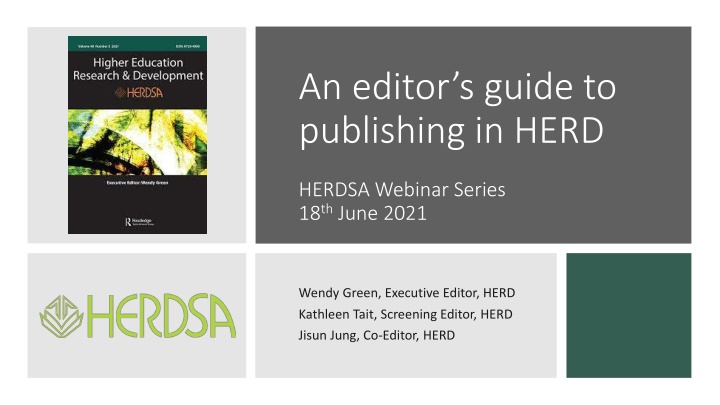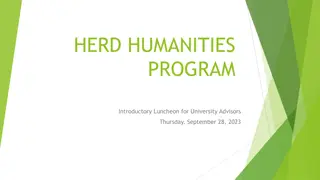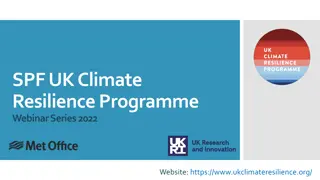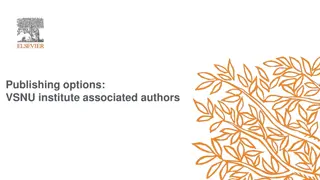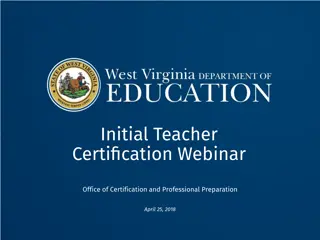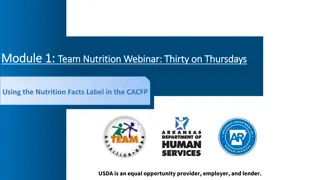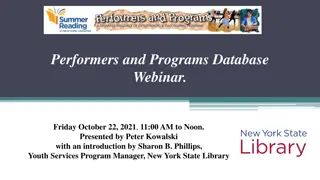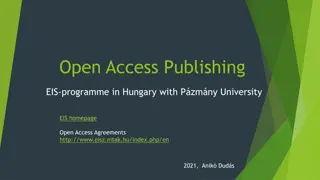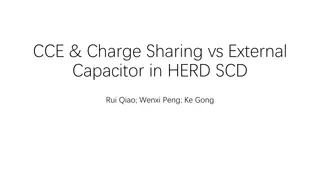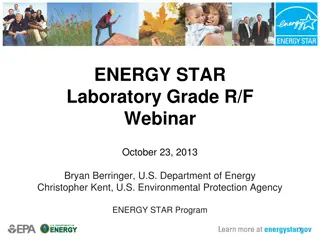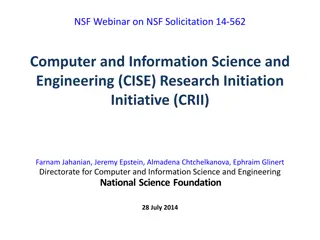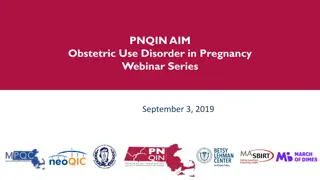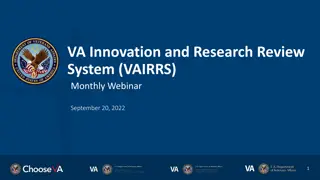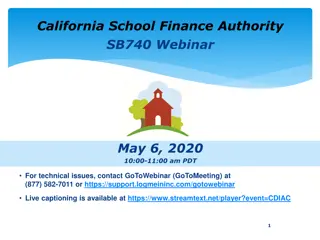Insights into Publishing in HERD: Webinar Series Summary
In the HERDSA Webinar Series, Wendy Green, Kathleen Tait, and Jisun Jung shed light on publishing in HERD. They discuss what editors and reviewers look for, how to select the right journal for your paper, and common reasons for paper rejections. HERD, a Q1 journal, has been influencing higher education research since 1982. With an Impact Factor of 2.129 and an acceptance rate of 18%, HERD welcomes empirical studies, theoretical articles, and essays providing fresh critical insights into higher education. Explore more about the journal's impact and submission criteria in this informative webinar.
Uploaded on Oct 07, 2024 | 2 Views
Download Presentation

Please find below an Image/Link to download the presentation.
The content on the website is provided AS IS for your information and personal use only. It may not be sold, licensed, or shared on other websites without obtaining consent from the author.If you encounter any issues during the download, it is possible that the publisher has removed the file from their server.
You are allowed to download the files provided on this website for personal or commercial use, subject to the condition that they are used lawfully. All files are the property of their respective owners.
The content on the website is provided AS IS for your information and personal use only. It may not be sold, licensed, or shared on other websites without obtaining consent from the author.
E N D
Presentation Transcript
An editors guide to publishing in HERD HERDSA Webinar Series 18thJune 2021 Wendy Green, Executive Editor, HERD Kathleen Tait, Screening Editor, HERD Jisun Jung, Co-Editor, HERD
What will we discuss today? Publishing in HERD Reviewing for HERD
Please click on the link below or scan the QR Please click on the link below or scan the QR code to access. code to access. Go to www.menti.com and use the code 5367 9010 https://www.menti.com/g37j597xk1
Publishing in HERD Publishing in HERD Some common questions 1. What do editors and reviewers of HERD look for? 2. How can I determine which journal is right for my paper? 3. What are the common reasons that papers are rejected?
Higher Education Research & Development (HERD) Journal of HERDSA published since 1982 Q1 journal Informs and challenges researchers, teachers, administrators, policy-makers and others concerned with the past, present and future of higher education 7 issues annually, inc. Special Issue Articles between 5000 and 7000 words
Our impact Google scholar ranking for HE: 5th The journal s 2019 Impact Factor is 2.129, ranking 78 / 263 in the Education & Educational Research JCR category January to December 2020 988 original submissions Acceptance rate: 18% (will decrease as submissions continue to increase)
Empirical higher education studies, which employ qualitative, quantitative, and mixed methodologies including big data Theoretical, philosophical and historical articles and essays that address higher education in any of its dimensions All articles must propose fresh critical insights into the area being addressed we ask authors to review former issues of HERD and, where possible, engage with previously published articles as part of preparing your manuscript for submission to us What are we looking for?
The paper provides an important critical and/or analytical insight that contributes something new to the field of higher education studies generally The issue/problem is well situated in an appropriate international HE literature The paper demonstrates methodological soundness The conclusion is well supported and persuasively argued The paper is succinct and coherent Overall, the paper reads well and will engage a broad, international higher education audience. Our review criteria
Not a good fit for Journal (too specialized)* Does not offer new, significant insight Applied research/ account of practice* Weak, inappropriate or no conceptual framing Does not address intended audience (inter- disciplinary; international)* Does not engage with Journal s conversation * Not (considered to be*) methodologically sound Not effectively situated in international HE literature Limitations and/or implications not addressed Stylistic and language reasons What are the common reasons that papers are rejected by HERD? * May be addressed by submitting to another Journal
Aims & Scope: Aims & Scope: Higher Education Research & Higher Education Research & Development Development Audience? Informs & challenges researchers, teachers, administrators, policy- makers [re] past, present and future of HE.. framed for international audience. Significance? Must make significant, original contribution to the theory, practice or research must propose fresh critical insights Approaches/methodologies? Theoretical, philosophical & historical empirical qualitative, quantitative & mixed methods
Aims & Scope: Aims & Scope: International Journal for the Scholarship of Teaching & Learning Audience? Open electronic journal for an international audience Significance? Anchored in inquiry and engagement re-conceptualizes teaching as ongoing, scholarly process emphasis on improved student learning . Approaches/methodologies? Not mentioned
Ideally, select an appropriate journal before you start writing by 1. Read the Journal's Aims & Scope/ About page for types of mss accepted 2. Skimming the Table of contents of previous issues: Does your work engage with the conversation in the journal? ( we ask authors to review former issues of HERD and, where possible, engage with previously published articles as part of preparing your manuscript for submission to us ) How can I determine which journal is right for my paper? 3. Consider your primary audience HE, multi-disciplinary or your own discipline? 4. Examine the way the articles are written structure, style, length can you model your ms on these? 5. You might want to consider impact factor and journal ranking
Your questions?
Part 2: Reviewing (for HERD)
Please click on the link below or scan the QR Please click on the link below or scan the QR code to access. code to access. Go to www.menti.com and use the code 5367 9010 https://www.menti.com/g37j597xk1
HERD: Reviewer of the Year Award Timeliness: completion of timely reviews of at least four manuscripts within the previous calendar year. Review content: substantive feedback that reflects mission, scope, review criteria Review content: helpful ideas for moving the submission forward Review style: clear recommendations Review style: constructive, respectful tone https://think.taylorandfrancis.com/journal-prize-reviewer- of-the-year-award/
HERD review criteria HERD review criteria The paper provides an important critical and/or analytical insight that contributes something new to the field of higher education studies. The issue/problem is well situated in an appropriate international HE literature. The paper demonstrates methodological soundness. The conclusion is well supported and persuasively argued. The paper is succinct and coherent. Overall, the paper reads well and will engage an international higher education audience. Excellent ---- Good ---- Satisfactory ---- Poor Would you be willing to review a revision of this manuscript?
Timely: Mind time (accepting/declining the review invitation; completing the review) Clear and specific Constructive Ethical: Show integrity (confidentiality; conflict of interest) Consistent Good reviews Good reviews are are * Use the communication channel for Comments to editor
Bad reviews Bad reviews Editors perspectives Editors perspectives Show bias, prejudice (method/approach, gender, ethnicity, language, type of university, etc) Are disrespectful, use unprofessional expressions Focus on minutiae; e.g., only pointing out language problems (not focusing on research) Reject based on the personal beliefs/philosophy Too brief Are inconsistent; e.g., between the decision and comments: Recommends rejection on the basis of minor, clearly fixable problems Ask for unreasonable revisions
Bad reviews: Examples Bad reviews: Examples Criticizes or applauds without explanation Authors contribute greatly to the literature as well as in practical terms. I do not have any negative comments. Very clear work. Well done. There is one typo in page 3. I am not suggesting any specific revisions as I think this paper should be published as soon as possible. I could not understand what the author(s) wrote. It was unreadable.
Becoming a HERD Reviewer Becoming a HERD Reviewer Early Career Reviewer College of Reviewers Reviews for HERD are conducted by members of our College of Reviewers Internationally recognised higher education scholars who meet the following criteria, based on the depth and recency of their publications: at least three peer reviewed publications in peer reviewed higher education journals in the past decade. Trial period: Reviews 2- 3 mss, with feedback, before being Invited to become a regular reviewer for HERD If you would like to be considered as a reviewer for HERD, email the Managing Editor, Emily Giles, herd.giles@gmail.com. Please include relevant experience - previous reviewing experience and publications, if any. Explain interest and engagement in the broad field of HE.
More information Check the Higher Education Research & Development journal website for information about Aims & scope, metrics, instructions to authors, editorial board and policies, calls for new papers. https://www.tandfonline.com/loi/cher20 HERDSA Conference Pre-Conference workshop Joint conference session with the new HERDSA supported journal. Advancing Scholarship and Research in Higher Education (ASRHE).
